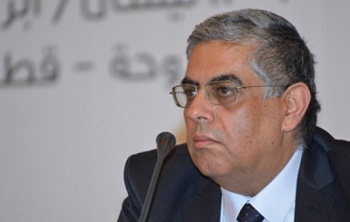
The Biden administration is looking to ‘heal the American spirit”
“Hosted by MIFTAH”s guest is researcher and expert in Israeli affairs, Antoine Shulhat, who speaks about the scene in Israel in the wake of Joe Biden winning the US presidential elections and the restoration of relations between the PA and Israel following President Trump’s defeat. He addresses the dramatic repercussions of this defeat on Israel at the political and security level, especially given how the United States working to rebuild its previous alliances abroad.
Shulhat expects Biden will not reverse Trump’s major decisions regarding the Palestinian-Israeli conflict such as moving the US embassy from Tel Aviv to Jerusalem or his recognition of Israel’s annexation of the Golan Heights. However, he does believe he will move more towards restoring some sort of balance in American relations with Israel and the Palestinians.
Biden and the two-state solution
Shulhat indicated that Trump’s defeat will have dramatic repercussions on Israel given the considerable gap between Trump and Biden’s foreign and security policies. Based on statements made by Israeli government spokespersons regarding a possible cut in the US security budget, Shulhat expects this could lead to less pressure on the Iranian regime and a return to the “policy of compliance” that former US President Barack Obama adopted and which culminated in the 2015 nuclear deal, in parallel with the Middle East and the Palestinian cause. On this, Shulhat thinks that while there are many possibilities, it is unlikely Biden will cancel the major decisions Trump made such as moving the US embassy to occupied Jerusalem and recognizing the annexation of the Syrian Golan Heights but will likely try to regain some balance with Israel and the Palestinians.
Reading into Israeli government statements, Shulhat believes the Biden-Netanyahu relationship (or any new Israeli Prime Minister) will not be as strong as the relationship with Trump, especially since Biden could disregard some of the components in Trump’s “deal of the century”, including giving a green light to the annexation of some areas of the West Bank. In addition to this, Biden has officially expressed his commitment to the two-state solution.
Moreover, Secretary of State-nominee, Antony Blinken recently spoke about the vision of the new US administration towards the Palestinian cause, stressing on Biden’s endorsement of a two-state solution. Blinken said the solution would preserve and strengthen military and intelligence cooperation between the two countries, including Israel’s military superiority. He also said the administration would call on both Israel and the Palestinians not to take unilateral steps that could prejudice any chance of returning to the two-state plan, adding that they would restore funding to the PA and reopen the US Consulate in East Jerusalem. Blinken also noted that the administration would transfer humanitarian and economic assistance to the Palestinians but on condition that they halt stipends to ‘those involved in terrorist operations.”
Obama’s third term
Shulhat believes the Biden administration will focus on “healing the American spirit” in accordance with the perimeters of the Democratic Party due to internal divisions and racial tensions, which reached their peak during the Trump administration. This is in addition to the impact of the Covid-19 pandemic, which delivered a major blow to both American lives and the economy and which will take precedence over foreign policy.
He also said it was plausible to interpret Biden’s strategic approaches through the lens of the Obama administration in which he was Vice President. The Obama administration supported Arab revolutions and worked on resolving the Palestinian-Israeli conflict on the basis of the two-state solution. The US even abstained on a UN Security Council resolution that condemns settlements in the Palestinian territories instead of its usual veto, contrary to expectations. This administration also economically supported the PA within its vision that a solution to the conflict will bring stability to the Middle East region. What’s more, the US signed the Iran nuclear deal, which Israel strongly opposed.
Shulhat continued that he believes Biden’s win was a huge disappointment to Netanyahu, who was hoping for a second term for Donald Trump. Still, Netanyahu did not wait long to ensure that the incoming US administration would adopt a political line that adamantly defends Israel’s interests. In the end, most political analysts agree that even with the new Biden administration, the United States will continue to consider Israel an important, if not the most important ally in the Middle East. Based on this, Israeli interests depend on developing and strengthening the relationship with this administration, even if there are differences in opinion.
Even though Biden stressed that his term in the White House would not be like a ‘third Barack Obama term”, given all the changes to the United States and the world since then, ample analyses have been based on the fact that Biden has appointed several people to key positions in his new administration who were part of Obama’s team. This, he says, prompts us to conclude there is a good chance that the Obama administration’s policies will continue rather than be any different.
“It is important to remember the messages Obama conveyed during his first trip to Israel in March, 2013 during which he recognized a ‘national state for the Jewish people’ as a means of paving the way for the Israeli nation-state law, and two, as a means of legitimizing the basis of the Zionist narrative, which considers the colonization of Palestine as a realization of the return of the Jewish people to the ‘Promised Land.”
“Liberation from Netanyahu” and banking on Biden
Shulhat maintained that the official Palestinian position is something of a courtship, saying we cannot separate the PA’s return to all forms of civil and security coordination with Israel from the context of this wager or from the context of the pace of normalization by several Arab countries with Israel, adding that this normalization has given Israel extra power against the Palestinians.
“I think Israel’s insinuation that it will postpone the ‘deal of the century’ is the best it will offer the Palestinians. I don’t expect we will see any Palestinian concessions for a return to the negotiating table except for the return to all forms of civil and security coordination, especially within this context of normalization, which coincides with Netanyahu’s mantra of “peace for peace” as an alternative equation to “land for peace”. This includes the premise that building and normalizing relations in the region is the way to reach a settlement to the Palestinian problem, not vice-versa.”
The changes to the current political scene in Israel and the upcoming elections are basically aimed at “Israel’s liberation from the clutches of the Netanyahu government”. The most recent show of this is Gideon Saar’s split from the Likud Party and his establishment of a new party.
Based on this, we must reiterate that whether Netanyahu stays in power or not is still the least important issue in the context of dealing with the specifics of Israel’s present situation and what this means for the conflict, Shulhat says. The more important issue lies in the changes this state and its political system are undergoing in light of its right-wing domination and how its foreign policies, both international and regional, will be impacted by these changes on the one hand, and how they are related to the sudden transformations in the world and region, on the other.
“What I can say is that all eyes in Israel will be on the repercussions of the Saar break from the Likud Party. However, we must take into consideration that the current political condition, which has been the status quo for a long time, points not only to a lack of a political narrative counter to the rightist narrative towards the Palestinian cause but also to a lack of real opposition against this rightist trend.”
Reigniting the international community in the service of the Palestinian cause
Shulhat said the almost inevitable option given the latest regional developments vis-à-vis normalization and the coronavirus pandemic and based on UN resolutions that support the Palestinian right to establishing a Palestinian state on the 1967 borders is to “reignite the international community in the service of the Palestinian cause.” He said this could coincide with attempts to prompt other parties to assume their role at the regional and international levels, maintaining that these efforts should mostly be geared towards Europe, which is expected to regain its political weight in tandem with the new US administration.
“At the Palestinian level, I must also point out the need to continue efforts to repair our domestic situation and to pull the rug out from under those who want to use it as a tool to derail the Palestinian cause” Shulhat maintains. What’s more, another ‘card’ is being taken advantage of, which is Arab normalization with Israel. “We must keep it in mind that this normalization is not limited to full diplomatic relations with Israel but also entails -- at a deeper level perhaps -- the normalization of its policies towards the occupation and settlements as a means of whitewashing them. Let us remember that this normalization took place in spite of the Palestinian cause and reflects an approach that considers the Palestinians as irrelevant to the political developments in the region. It also points to the beginning of the end of the Arab Peace Initiative, which stipulates that the normalization of any Arab relations with Israel cannot take precedence over a just solution to the cause of Palestine.”
Biden and the West
As previously mentioned, Shulhat believes the United States will move on the domestic front at the expense of its foreign policy. However, in this context, Shulhat pointed to some approaches the new administration will take, including restoring US participation in the Paris Climate Agreement and strengthening its alliance with its traditional allies in the West in general and with Western Europe in particular. According to a number of Israeli analyses, this alliance will have repercussions on Israel given that Europe prefers a conciliatory approach with Iran but a firmer one with Israel in regards to its policies towards the Palestinians.
At the UN, some observers are expecting relatively quick changes regarding two of its bodies: a halt to the withdrawal from WHO and a return to the Human Rights Council just like [former President Barack] Obama returned to the HRC after his predecessor George Bush Jr. pulled out. There is a consensus that inside and outside UN bodies, the Biden administration’s behavior will be affected by the competition and rivalry with China, Shulhat says, adding that they also believe there is no real difference between the Democratic and Republican Parties regarding the perceived threat from China. The Democratic Party platform publically declared that under certain conditions “firm measures” must be taken against Beijing. At the same time, Biden declared that his policy towards Russia would also be firmer. Based on this, there are predictions that US policies towards China and Russia could impact on Israel’s bilateral relations with these two countries.








